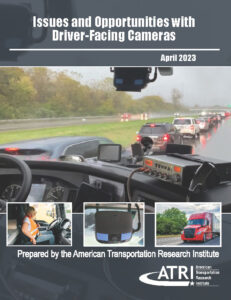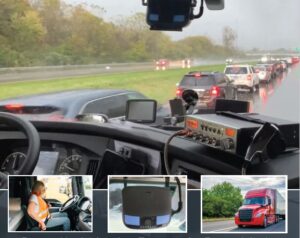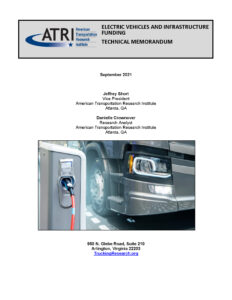Highlighted Research

Issues and Opportunities with Driver-Facing Cameras
The report identified specific carrier policies and driver management approaches that lead to higher driver ratings. Overall driver approval of driver-facing cameras increased by 87 percent when carriers used video footage for specific proactive safety measures.
Additional analyses focus on insurance and litigation considerations for in-cab cameras. Experts in both fields expressed preference for event-based driver-facing cameras over continuously recording cameras, and they concurred with drivers that primary video footage access should be limited to safety managers as much as possible.
Technology Research
- New ATRI Research Identifies Strategies for Improving Driver-Facing Camera Approval and Utilization 04/2023
- Issues and Opportunities with Driver-Facing Cameras 04/2023
- Electric Vehicles and Infrastructure Funding – Technical Memorandum 09/2021
- Redefining the Role of Government Activities in Automated Trucking 01/2020
- ATRI’s E-Commerce Impacts on the Trucking Industry 02/2019
- Longitudinal Study of ITS Implementation: Decision Factors and Effects 04/2013
- Roll Stability Systems: Cost Benefit Analysis of Roll Stability Control Versus Electronic Stability Control Using Empirical Crash Data 08/2012
- HMCRP Report 8: Evaluation of the Use of Electronic Shipping Papers for Hazardous Materials Shipments 07/2012
- Efficacy of Web Based Instruction to Provide Training on Federal Motor Carrier Safety Regulations 05/2011
- Benefit Cost Analyses of Onboard Safety Systems 02/2009
- Safety Impacts of Speed Limiter Device Installations on Commercial Trucks and Buses 11/2008
- Incentives for Deployment of Onboard Safety Systems – Final Report 12/2007
- The Role of Speed Governors in Truck Safety: Industry Speed Governor Use Survey 03/2007
- Electronic On-Board Recorder Adoption in the Trucking Industry: Issues and Opportunities 09/2006
Related News

New ATRI Research Focuses on Diesel Technician Shortage: Input Needed from Technicians, Shops and Training Schools
The American Transportation Research Institute (ATRI) is seeking important input and guidance for their priority research on the growing diesel technician shortage. Recognizing the complex issues that exist in training, recruiting and retaining diesel technicians, ATRI has developed three separate surveys for technicians, maintenance facilities and technician training schools.

ATRI Seeks Motor Carrier Guidance on Advanced Safety Technologies on Behalf of TechCelerate Now Program
The American Transportation Research Institute (ATRI) is initiating research on the role that advanced safety systems can have in improving safety and productivity in trucking. This research is part of the ongoing TechCelerate Now program, which is sponsored by the Federal Motor Carrier Safety Administration (FMCSA). The TechCelerate Now research team includes ATRI, ATA’s Technology & Maintenance Council (TMC) and the OOIDA Foundation.

New ATRI Research Identifies Strategies for Improving Driver-Facing Camera Approval and Utilization
The American Transportation Research Institute (ATRI) today released a new report that investigates industry attitudes and concerns toward driver-facing and road-facing cameras (DFCs/RFCs). The research identified points of consensus and potential compromise on in-cab camera systems and policies among truck drivers, motor carriers, legal experts and insurers. Based on this analysis, the report proposes strategies for improving both driver approval and camera utilization that can improve safety, privacy, litigation and insurance risk management.

ATRI Launches Survey to Gather Truck Driver Perspectives on Driver-Facing Cameras
FOR IMMEDIATE RELEASEContact: Dan Murray (651) 641-6162DMurray@trucking.orgJuly 25, 2022 Atlanta, GA – The American Transportation Research Institute (ATRI) today launched a short survey to better

New ATRI Analysis Explores How Electric Vehicles Could Contribute to Highway Trust Funds
FOR IMMEDIATE RELEASE Contact: Dan Murray (651) 641-6162 September 29, 2021 Arlington, Virginia – The American Transportation Research Institute today released research that describes a

New Research from ATRI Identifies E-Commerce Impacts on the Trucking Industry
FOR IMMEDIATE RELEASE Contact: Dan Murray (651) 641-6162 February 5, 2019 Arlington, Virginia – The American Transportation Research Institute (ATRI) today released an analysis of the


